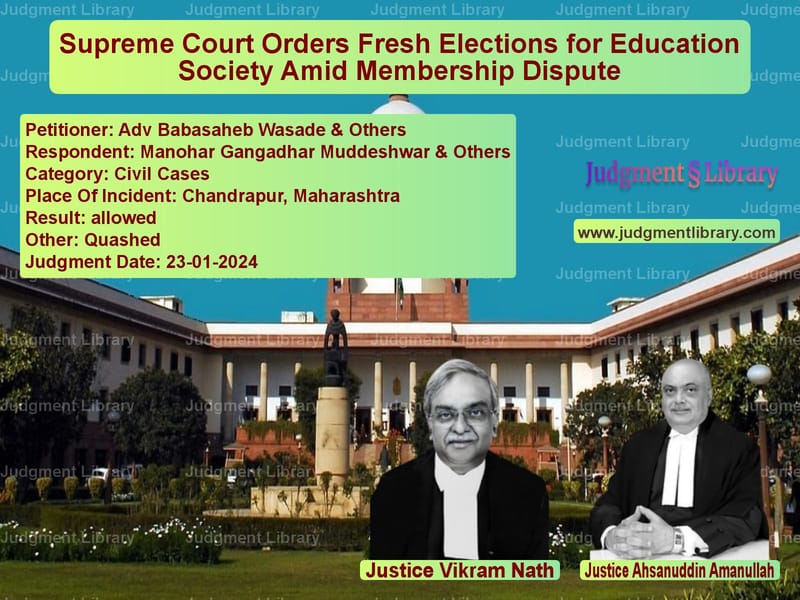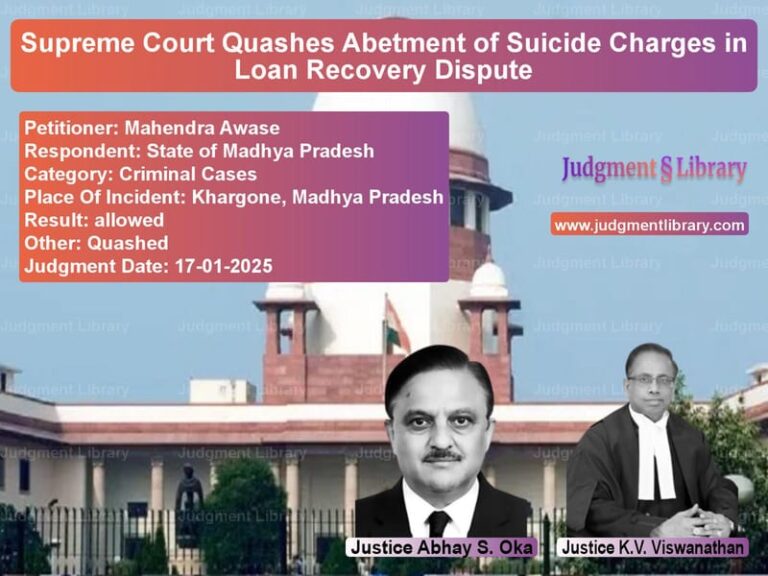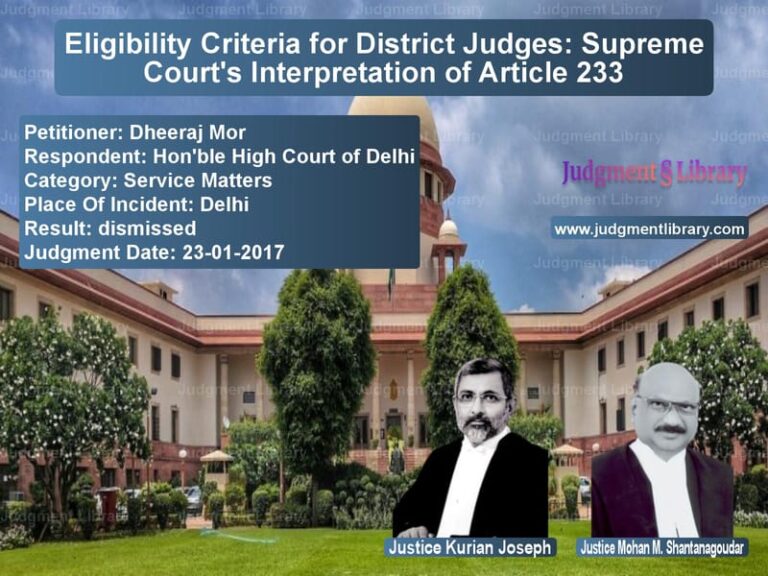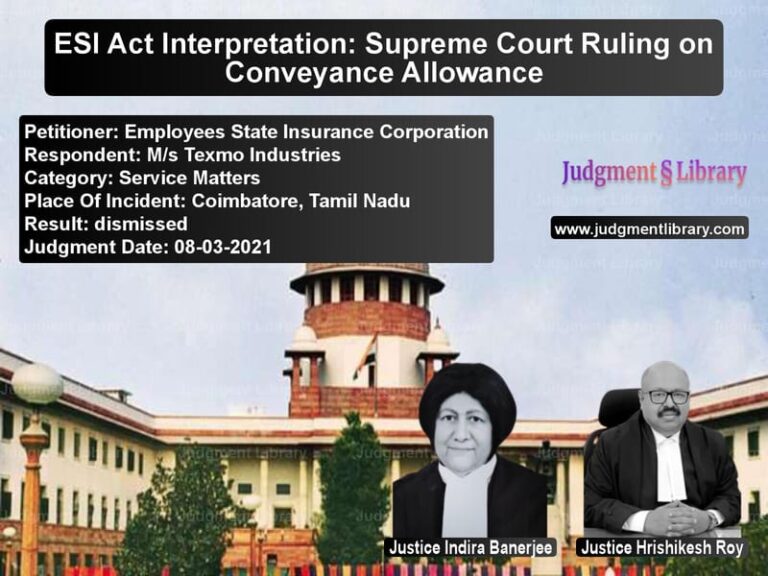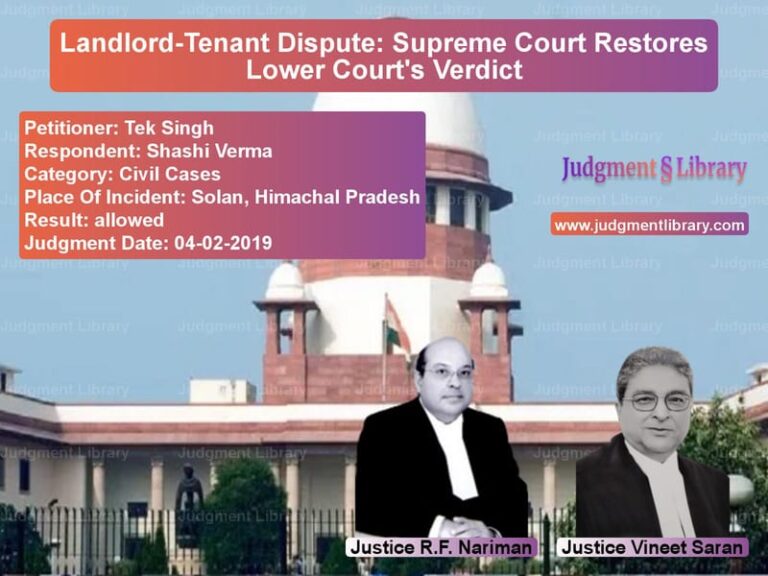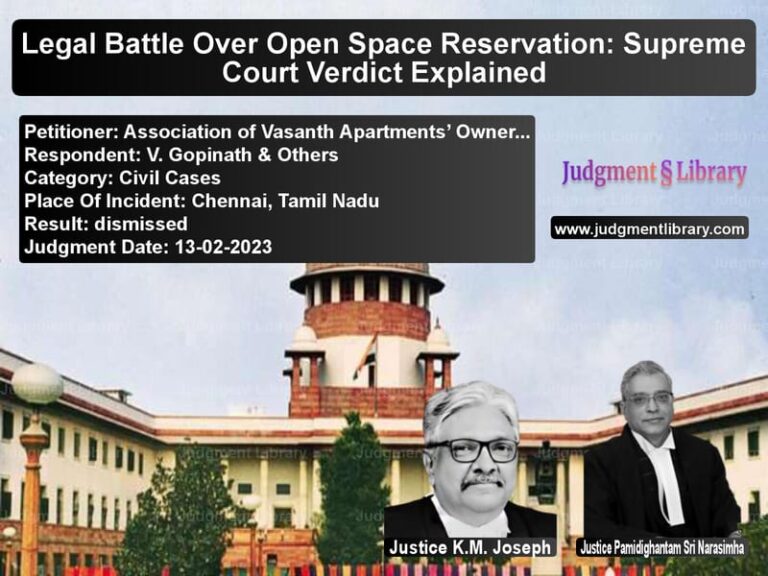Supreme Court Orders Fresh Elections for Education Society Amid Membership Dispute
The Supreme Court of India has ruled in favor of resolving long-standing disputes in the Shikshan Prasarak Mandal, Mul, a charitable society that operates educational institutions. The case involved a dispute over the validity of an election held in 2002 and the subsequent leadership claims by different factions of the society. The Court not only upheld the election results but also directed fresh elections to ensure transparency and proper governance.
Background of the Case
The Shikshan Prasarak Mandal, established in 1946, is registered as a charitable society under the Societies Registration Act, 1860, and also as a public trust under the Bombay Public Trusts Act, 1950. The society runs educational institutions and is governed by a set of rules and regulations. It has four types of members: Life Members, Employee Members, Ordinary Members, and Donor Members, each required to pay an annual membership fee.
After the demise of key office bearers, including the President, Vice-President, and Secretary, no elections were conducted for years. Due to this, the Executive Body, under the leadership of the late President, passed a resolution on July 1, 1997, appointing Advocate Babasaheb Wasade as the Working President to manage the society’s affairs. However, his authority was later challenged by a faction within the society.
In 2002, 16 members of the society requested an extraordinary general meeting to conduct elections. Acting on this request, Wasade issued a notice on September 3, 2002, summoning a meeting for September 8, 2002, in which he was elected as President, and a new Executive Committee was formed. A change report was then filed under Section 22 of the Bombay Public Trusts Act before the Assistant Charity Commissioner, Chandrapur.
Objections and Legal Proceedings
Seven individuals, claiming to be members of the society, objected to the election, arguing that:
- They were not served notices for the meeting.
- Wasade had no authority to issue the notice.
- Some signatories requesting the election were not valid members of the society.
The Assistant Charity Commissioner rejected the change report on June 19, 2010. Wasade appealed to the Joint Charity Commissioner, who overturned the rejection and accepted the election results on April 12, 2016.
However, the seven objectors challenged this decision before the District Judge-IV, Chandrapur, who set aside the approval and ruled in their favor on July 29, 2016. This ruling was further upheld by the Nagpur Bench of the Bombay High Court on July 20, 2017. The matter then reached the Supreme Court.
Key Issues Before the Supreme Court
The Supreme Court examined the following key issues:
- Whether the Working President had the authority to convene the election meeting.
- Whether the objectors, who had not paid their membership fees, were entitled to notice.
- Whether non-service of notice invalidated the election.
- Whether invalid members were part of the election process.
- Whether the respondents had the legal standing to challenge the election results.
Supreme Court’s Ruling
The Supreme Court ruled in favor of the appellants, stating that:
- The Working President was validly appointed in 1997 and had the authority to manage society affairs, including convening meetings.
- The seven objectors had not paid their membership fees and were thus disqualified from voting under Section 15 of the Societies Registration Act.
- Since they were not entitled to vote, the absence of notice did not invalidate the election process.
- Most signatories requesting the election were valid members, and the objections regarding their membership lacked sufficient proof.
- The respondents challenging the election had no legal standing as they were neither trustees nor valid members of the society.
The Court ruled:
“In the absence of elected office bearers, the Working President was the only authority to act upon the request of members. The meeting convened for elections cannot be invalidated merely on procedural technicalities when the broader mandate of the members was honored.”
Directive for Fresh Elections
Despite ruling in favor of the appellants, the Supreme Court acknowledged the prolonged dispute and its impact on the functioning of the society. To ensure smooth governance, the Court directed the Charity Commissioner to conduct fresh elections within six months, ensuring that only valid members participate.
The Court further instructed:
- The Charity Commissioner should verify membership records before elections.
- Members in default of fees must clear dues before being eligible to vote.
- A transparent electoral process should be followed to avoid future disputes.
Implications of the Judgment
The ruling has significant implications for society governance, charitable trusts, and membership rights:
- Reaffirms that membership rights are conditional upon fulfilling obligations, such as paying dues.
- Provides clarity on the authority of interim office bearers in managing elections during vacancies.
- Emphasizes procedural fairness while prioritizing the need for functional governance.
- Ensures that long-standing disputes do not hamper the administration of educational institutions.
Conclusion
The Supreme Court’s decision resolves a two-decade-long dispute while ensuring fair representation in the society’s governance. By validating the authority of the Working President and clarifying membership rules, the judgment sets a precedent for similar cases concerning society management and trust administration. With fresh elections now mandated, the ruling ensures that the Shikshan Prasarak Mandal operates with legitimacy, accountability, and transparency.
Petitioner Name: Adv Babasaheb Wasade & Others.Respondent Name: Manohar Gangadhar Muddeshwar & Others.Judgment By: Justice Vikram Nath, Justice Ahsanuddin Amanullah.Place Of Incident: Chandrapur, Maharashtra.Judgment Date: 23-01-2024.
Don’t miss out on the full details! Download the complete judgment in PDF format below and gain valuable insights instantly!
Download Judgment: adv-babasaheb-wasade-vs-manohar-gangadhar-mu-supreme-court-of-india-judgment-dated-23-01-2024.pdf
Directly Download Judgment: Directly download this Judgment
See all petitions in Contract Disputes
See all petitions in Property Disputes
See all petitions in Succession and Wills
See all petitions in Judgment by Vikram Nath
See all petitions in Judgment by Ahsanuddin Amanullah
See all petitions in allowed
See all petitions in Quashed
See all petitions in supreme court of India judgments January 2024
See all petitions in 2024 judgments
See all posts in Civil Cases Category
See all allowed petitions in Civil Cases Category
See all Dismissed petitions in Civil Cases Category
See all partially allowed petitions in Civil Cases Category

